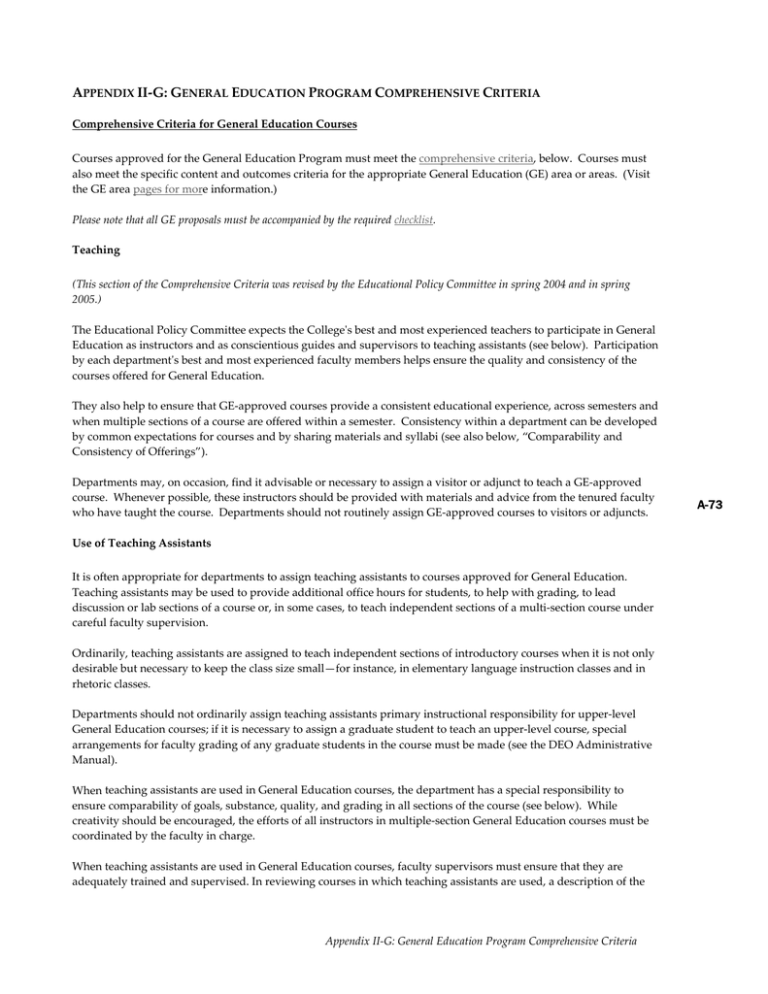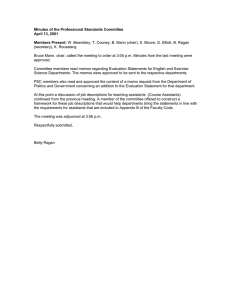A II‐G: G E
advertisement

APPENDIX II‐G: GENERAL EDUCATION PROGRAM COMPREHENSIVE CRITERIA Comprehensive Criteria for General Education Courses Courses approved for the General Education Program must meet the comprehensive criteria, below. Courses must also meet the specific content and outcomes criteria for the appropriate General Education (GE) area or areas. (Visit the GE area pages for more information.) Please note that all GE proposals must be accompanied by the required checklist. Teaching (This section of the Comprehensive Criteria was revised by the Educational Policy Committee in spring 2004 and in spring 2005.) The Educational Policy Committee expects the Collegeʹs best and most experienced teachers to participate in General Education as instructors and as conscientious guides and supervisors to teaching assistants (see below). Participation by each departmentʹs best and most experienced faculty members helps ensure the quality and consistency of the courses offered for General Education. They also help to ensure that GE‐approved courses provide a consistent educational experience, across semesters and when multiple sections of a course are offered within a semester. Consistency within a department can be developed by common expectations for courses and by sharing materials and syllabi (see also below, “Comparability and Consistency of Offerings”). Departments may, on occasion, find it advisable or necessary to assign a visitor or adjunct to teach a GE‐approved course. Whenever possible, these instructors should be provided with materials and advice from the tenured faculty who have taught the course. Departments should not routinely assign GE‐approved courses to visitors or adjuncts. Use of Teaching Assistants It is often appropriate for departments to assign teaching assistants to courses approved for General Education. Teaching assistants may be used to provide additional office hours for students, to help with grading, to lead discussion or lab sections of a course or, in some cases, to teach independent sections of a multi‐section course under careful faculty supervision. Ordinarily, teaching assistants are assigned to teach independent sections of introductory courses when it is not only desirable but necessary to keep the class size small—for instance, in elementary language instruction classes and in rhetoric classes. Departments should not ordinarily assign teaching assistants primary instructional responsibility for upper‐level General Education courses; if it is necessary to assign a graduate student to teach an upper‐level course, special arrangements for faculty grading of any graduate students in the course must be made (see the DEO Administrative Manual). When teaching assistants are used in General Education courses, the department has a special responsibility to ensure comparability of goals, substance, quality, and grading in all sections of the course (see below). While creativity should be encouraged, the efforts of all instructors in multiple‐section General Education courses must be coordinated by the faculty in charge. When teaching assistants are used in General Education courses, faculty supervisors must ensure that they are adequately trained and supervised. In reviewing courses in which teaching assistants are used, a description of the Appendix II‐G: General Education Program Comprehensive Criteria A-73 methods used to select, train, and supervise the teaching assistants must be included with the review materials. It is especially important that teaching assistants who are given responsibility for individual sections (as in language instruction, Interpretation of Literature, and Rhetoric courses) have comprehensive preparation and on‐going oversight. The General Education Curriculum Committee and the Educational Policy Committee will expect additional information on the training and supervision of teaching assistants in these courses. Critical Thinking, Analysis, and Communication (This section of the Comprehensive Criteria was revised by the Educational Policy Committee in spring 2004.) One of the goals of the General Education Program is to develop each studentʹs ability to use effectively the oral, written, visual, and research skills appropriate to the liberal arts and sciences. Formal and informal opportunities for improving understanding, interpretation, and use of the various “languages” of the liberal arts and sciences‐ including mathematics, natural and social science methods, music and fine arts techniques, and the use of new technologies of communication‐are all included as possibilities for satisfying the criterion for Critical Thinking, Analysis, and Communication. General Education courses typically teach the research and inquiry skills appropriate to the discipline(s) of the course as an integral part of the course content. Every General Education course should include activities appropriate to the content and appropriate to the level of that course. Assignments and activities in large lecture courses will be different from those in small seminars, and assignments and activities in upper‐level courses will be different from those in lower‐level and introductory courses. Instructors should consider assignments that are compatible with, and will contribute to, the educational objectives of the course and the General Education area(s) in which the course is approved, while also attending to this comprehensive criterion of development of critical thinking, analysis, and communication. Breadth A-74 In many cases, the course or courses taken to satisfy a requirement of the General Education Program is the only experience in an area that a student will have while completing a degree. A course approved for General Education should provide a breadth of experience in content and/or in methods in the area(s) in which it is approved. Such breadth is found typically in introductory courses. Upper‐Level Courses It is appropriate to have some upper‐level courses approved for General Education. These courses should contain a breadth of subject matter or application that distinguishes them from other departmental courses offered at the upper level. Upper‐level courses, even those that have a narrow focus in some respects, can provide breadth in others, for example by using a multi‐disciplinary approach or a multiplicity of perspectives. Upper‐level courses approved for General Education may have prerequisites, but the prerequisites should also be courses approved for General Education. The prerequisites may be offered by the department or by other departments. Comparability and Consistency of Offerings While courses approved for General Education should incorporate changes in the field or discipline, include new information, and benefit from new methodologies, these courses—especially multi‐section courses—should also offer consistency of instruction and focus. When a department or instructor substantially changes a course’s content, instructional design, size, or other element, the course should be reviewed as a new offering. Particular care should be taken by departments and in the review process to ensure that versions of General Education courses offered through Saturday & Evening Classes and Guided Independent Study courses, and in the Appendix II‐G: General Education Program Comprehensive Criteria Summer Sessions (including the three‐week intensive session) are comparable to the version taught in “regular” semester offerings. Consistency and comparability in grading is also important in the General Education Program. Ordinarily, courses approved for General Education are expected to reflect the Collegeʹs “Recommended Grade Distributions,” though particular situations and specific courses may, for valid pedagogical and other reasons, differ in grade distribution from the recommendations. Oversight of grading is a central responsibility of faculty supervision and object of review by the GECC and the EPC. Frequency of Course Offerings Courses approved for General Education should be readily available to students and an integral part of the course offerings of the College and the offering departments. Consistency and comparability are more likely and more easily ensured when courses are offered on a regular basis. Ordinarily, courses offered less frequently than once every two years will not be approved for General Education and an approved course offered less frequently will be subject to review as a new offering. Approval of Courses in More than One Area The interdisciplinary strength of the College of Liberal Arts and Sciences is reflected in the development of some courses that meet the criteria of more than one General Education area. Courses that meet the criteria of more than one area may be approved in more than one area. The offering department is responsible for providing review materials addressing the criteria of each area for which approval is requested. A-75 Appendix II‐G: General Education Program Comprehensive Criteria


